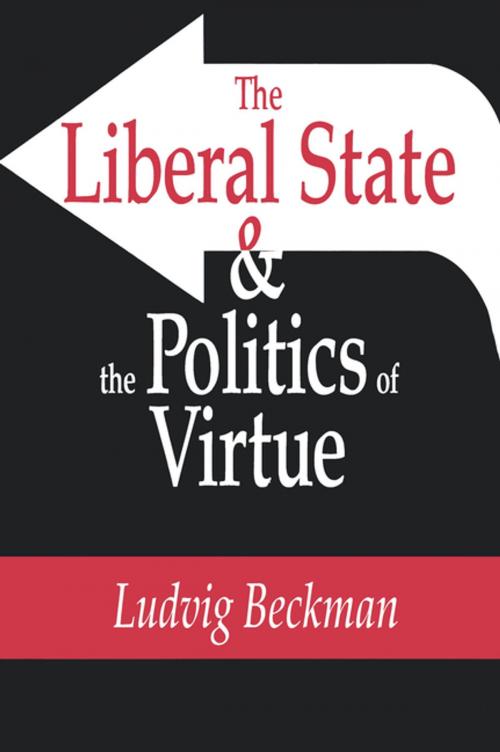The Liberal State and the Politics of Virtue
Nonfiction, Social & Cultural Studies, Political Science, Politics, History & Theory| Author: | Ludvig Beckman | ISBN: | 9781351325424 |
| Publisher: | Taylor and Francis | Publication: | April 27, 2018 |
| Imprint: | Routledge | Language: | English |
| Author: | Ludvig Beckman |
| ISBN: | 9781351325424 |
| Publisher: | Taylor and Francis |
| Publication: | April 27, 2018 |
| Imprint: | Routledge |
| Language: | English |
At the start of the new millennium there has been a growing awareness that traditional political institutions and ideologies do not correspond to the demands and aspirations held by many individuals and groups. Ideals and interests previously without much impact on the political debate have gained access to the public arena. These new claims include demands for recognition of homosexuals and their rights, affirmation of the particularities of indigenous peoples, sensitivity to the cultures and languages of immigrants, respect for children and their needs, solidarity with people of the developing countries and their fight for independence, care for nature, animals, attention to the social status of women, and so on. As a consequence, many governments now regulate and support many different conceptions of the good life and its virtues.In this volume, schematically divided into two parts, Ludvig Beckman challenges the common view that support for the good life, the politics of virtue, is in conflict with liberal principles. In clear, analytical language he addresses the question of what a state should do. Chapter 1 attempts to specify the meaning of "liberalism"; chapter 2 discusses the meaning of tolerance and makes more specific the notion of "virtue"; chapters 3 and 4 assess ethical and political liberalism as exemplified by the writings of Ronald Dworkin and John Rawls. In part two, chapter 5 discusses the clash between norms of justice and conceptions of virtue in the family; chapter 6 explores the meaning of the idea of an ethically neutral state; chapter 7 explores three different arguments for the neutral state as found in the work of Ronald Dworkin; chapter 8 presents an analysis of the idea of the neutral state with the theory of John Rawls put under scrutiny; chapter 9 explains why the attempt to justify the neutral state by referring to modified skepticism fails and proposes a distinction between being skeptical and being critical.Participating in the current debate on communitarianism, The Liberal State and the Politics of Virtue will be particularly interesting to people engaged in the public debate on ethics, morality and the state. It will also be of interest to teachers and researchers in the fields of politics and philosophy.
At the start of the new millennium there has been a growing awareness that traditional political institutions and ideologies do not correspond to the demands and aspirations held by many individuals and groups. Ideals and interests previously without much impact on the political debate have gained access to the public arena. These new claims include demands for recognition of homosexuals and their rights, affirmation of the particularities of indigenous peoples, sensitivity to the cultures and languages of immigrants, respect for children and their needs, solidarity with people of the developing countries and their fight for independence, care for nature, animals, attention to the social status of women, and so on. As a consequence, many governments now regulate and support many different conceptions of the good life and its virtues.In this volume, schematically divided into two parts, Ludvig Beckman challenges the common view that support for the good life, the politics of virtue, is in conflict with liberal principles. In clear, analytical language he addresses the question of what a state should do. Chapter 1 attempts to specify the meaning of "liberalism"; chapter 2 discusses the meaning of tolerance and makes more specific the notion of "virtue"; chapters 3 and 4 assess ethical and political liberalism as exemplified by the writings of Ronald Dworkin and John Rawls. In part two, chapter 5 discusses the clash between norms of justice and conceptions of virtue in the family; chapter 6 explores the meaning of the idea of an ethically neutral state; chapter 7 explores three different arguments for the neutral state as found in the work of Ronald Dworkin; chapter 8 presents an analysis of the idea of the neutral state with the theory of John Rawls put under scrutiny; chapter 9 explains why the attempt to justify the neutral state by referring to modified skepticism fails and proposes a distinction between being skeptical and being critical.Participating in the current debate on communitarianism, The Liberal State and the Politics of Virtue will be particularly interesting to people engaged in the public debate on ethics, morality and the state. It will also be of interest to teachers and researchers in the fields of politics and philosophy.















